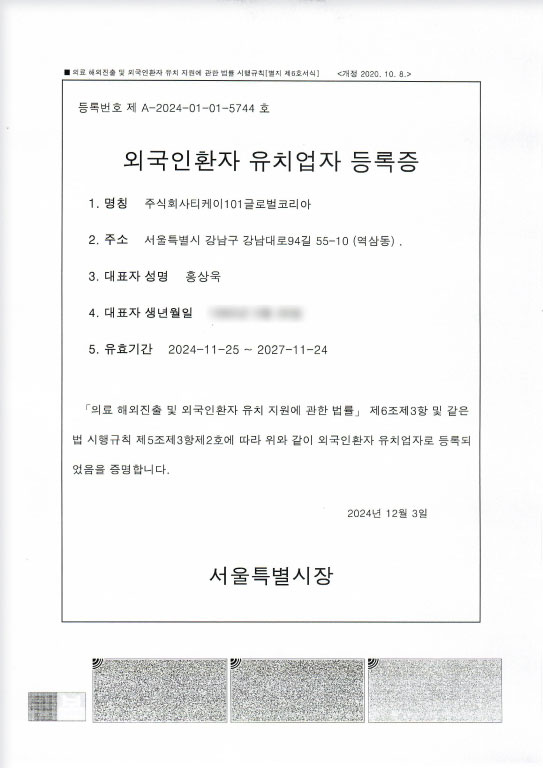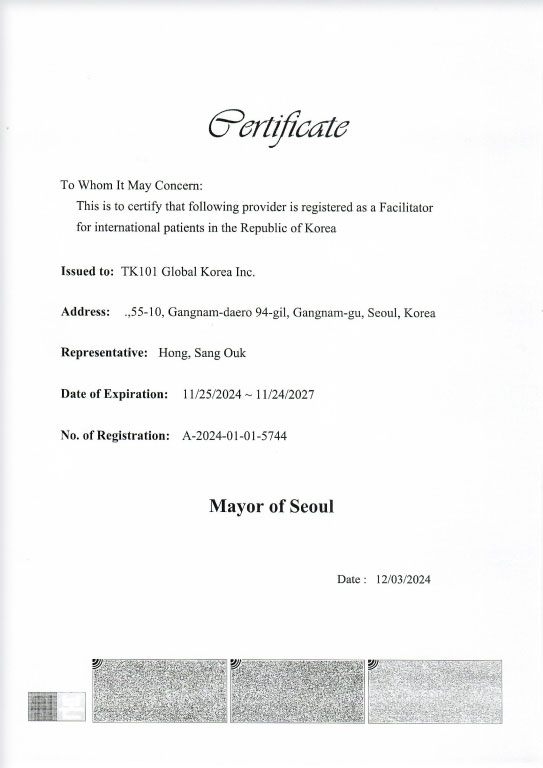

South Korea is renowned for its world-class medical technology and services.In 2016 alone, 364,189 international patients visited the country—a 22.6% increase from the previous year. Of these, 216,657 chose Seoul as their destination. The capital boasts 21,507 medical institutions and is home to 14 of the nation’s top 43 general hospitals (KOSIS, 2015), offering exceptional standards of care.


Medical institutions in Korea offer a wide range of specialties and are capable of meeting the needs of foreign patients at every level—from local clinics and hospitals to JCI-accredited general hospitals. In addition, there are a total of 1,924 registered medical tourism companies in Korea, with 1,227 located in Seoul (Korea Health Industry Development Institute, 2017), making it convenient for foreign patients to access medical services and consultations.
Korean medical tourism offers a wide range of wellness programs beyond treatment, including hot springs, jjimjilbang (Korean saunas), and temple stays. With smart medical systems powered by advanced IT technology, international visitors can enjoy a more convenient and seamless healthcare experience.


Incheon International Airport is approximately 60 kilometers from Seouland is accessible within an hour via airport rail, buses, or taxis. Seoul’s well-developed public transportation network allows foreign patients to reach medical institutions quickly and efficiently.

Customized plastic surgery for natural beauty

Professional skin care and treatments for healthy, radiant skin

Personalized health check-up programs with precise diagnostics

Advanced cancer treatments and surgical services with the latest medical technology








To apply for a visa for medical tourism in Korea, there are two types of visas are available depending on the length of stay:
Direct Application: Patients can apply directly at a Korean embassy or consulate. Required documents include:
· Completed visa application form
· Copy of passport
· Medical diagnosis
· Appointment confirmation for treatment or recuperation issued by a Korean medical institution
· Proof of financial ability to cover treatment and living expenses
· Additional documents such as a certificate of family relationship, if required by the consulate
· For treatments under 90 days, it is also possible to enter Korea with a tourist or short-term visit visa and receive medical treatment. However, if an extension of stay is required after entry, a visa status change may be required.
· Immediate family members such as the patient’s spouse, children, or caregivers may accompany the patient, but must apply for their own visas separately.
* For more detailed information, please visit the [official MEDICAL KOREA website]。

Accommodation is more than just a place to sleep—it plays a key role in the overall satisfaction of your trip. In Korea, travelers can choose from a wide range of options, including traditional Hanok stays, cozy guesthouses, luxurious 5-star hotels, and affordable motels. Discover the diverse types of accommodations Korea has to offer, where comfort meets culture for a truly memorable stay.

In Korea, the culture of enjoying a relaxing staycation at a hotel, known as a ‘hocance’, has become popular. A wide range of options is available, from domestic brands to international luxury hotels.

Motels in Korea are a budget-friendly accommodation option. Many offer hotel-quality bedding, modern amenities, and even high-performance PCs, making them a practical and convenient choice for travelers.

For a deeper experience of traditional Korean culture, consider staying in a hanok—a traditional Korean house. These charming accommodations offer a serene atmosphere where you can relax and enjoy nature, all while benefiting from modern amenities that ensure a comfortable stay.

Guesthouses offer affordable prices and a variety of room options. Some also run exchange programs like parties, providing opportunities to connect with both Korean and international travelers.

At Incheon International Airport, a variety of transportation options are available, including the Airport Railroad Express (AREX), subway, airport limousine buses, and international taxis. It takes approximately 43 minutes to reach Seoul Station via the express train, and about 1 hour and 30 minutes by car.

The Airport Railroad provides a fast and efficient connection between Incheon International Airport and Seoul Station. It operates both express trains and all-stop trains that stop at 14 stations, making travel to downtown Seoul convenient.

The airport limousine bus offers direct travel from Incheon International Airport to downtown Seoul without transfers. Multiple routes are available, and tickets can be purchased with cash or credit card at designated ticket booths in Terminal 1 and Terminal 2.

After 11:30 p.m., most public transportation services stop operating. During late hours, the only available option is the late-night bus service, marked with an “N”, which operates in Seoul and the Gyeonggi region. Fares can be paid with a transportation card or in cash.

Taxis in Korea are categorized into regular, deluxe, international, and large deluxe taxis. Regular and deluxe taxis are available on the first floor of Incheon Airport, while international taxis require advance reservation. Payments can be made by cash, credit card, or transportation card.